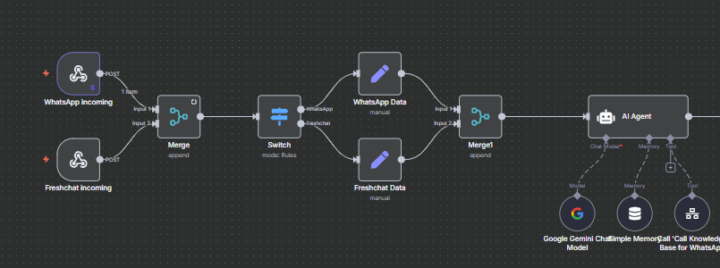Activity
Mon
Wed
Fri
Sun
Oct
Nov
Dec
Jan
Feb
Mar
Apr
May
Jun
Jul
Aug
Sep
What is this?
Less
More
Memberships
AI Automation (A-Z)
99.7k members • Free
AI Automation Society
143.8k members • Free
AI Automation Agency Hub
248.6k members • Free
Agency Owners
16.8k members • Free
Facebook Ads Alchemy (Free)
1.5k members • Free
Self Inquiry Support Group
5k members • Free
Max Business School™
244k members • Free
15 contributions to AI Automation Society
The onboarding + contract templates we use for hiring automation assistants
After hiring 39 employees offshore over the past four years, I thought I’d share some of the mistakes and lessons our team has picked up along the way. In talking with a bunch of AI agency founders recently, I’ve noticed that most of them can’t scale because they’re buried in automation work, and they put off making their first hire because it feels daunting. Hopefully, these six lessons make that step a little easier. START WITH A CONTRACT A lot of problems creep in if you skip this step. The contract doesn’t need to be filled with legal jargon. Just something both sides can point back to if questions come up, outlining expectations around working hours, pay, responsibilities, and a paid trial period. Happy to share a template. OUTLINE INITIAL PROJECTS To start with, choose a small project that can be completed within 1-2 weeks. This gives both you and your automation assistant a chance to go through a full work cycle quickly and align on expectations and workflows. CREATE AN ONBOARDING CHECKLIST Spend some time thinking through what you want the onboarding experience to be like, and define the steps in a checklist. This should include: Setting up necessary accounts, ensuring tool access, and clarifying weekly tasks and goals for the first month. OVER-COMMUNICATE AT THE START Daily check-ins might feel like too much, but they will save you from weeks of misalignment. You’ll review what your assistant accomplished the previous day, discuss what they plan to work on today, and address any blockers they might be facing. After the first two weeks, you can transition to async check-ins. HIRE FOR TRAITS, NOT JUST SKILLS New AI and automation tools are being released on a weekly basis. You don’t need someone who is an expert at everything. You need somebody who is curious, proactive, communicates well, and can learn things quickly. HAVE A REQUIREMENTS DOC FOR YOUR PROJECTS The best ways to save yourself time (and respect your assistant’s time) is to put together a lightweight PRD (Product Requirements Document). At a minimum, outline the scope of the project, the KPIs or success metrics you care about, and the tools or resources they’ll need access to.
Trouble accessing my n8n instance
Am I the only one having trouble logging in into my n8n account. Or there's a server issue?
MERGE NODE ONLY PASSING 1 ITEM INSTEAD OF 2!
hey I'm trying to build a whatsApp chatbot that can handle responses both coming from WhatsApp and web chat widget (using freshchat for this) My whatsapp flow is working fine and very well - so basically I build the whatsapp chatbot. now I want to make this workflow or ai agent also handle responses and respond intelligently on a web chat widget for that I'm using webhook so that whenever a user messages something on the web chat widget it receives the messages. So I have two webhooks - one that catches messages from whatsapp and another one that catches messages from web chat widget - both are working fine - I have tested it. however when it comes to merging the output from both with 'merge node' it is only giving me my whatsapp data output and not my web chat widget output. Can anyone tell me why is this happening? Basically my merge node is only passing 1 item instead of passing 2 item.

2 likes • 8d
@Md Ayaan Ali because you are using 2 different webhooks that act upon a certain event at different times, it's not practical for you to use the merge node here because the merge node combines data that has come together at once. That's why you are seeing that it only passes on one output. You use merge node somewhere in between the workflow, when data is guaranteed to be executed at once from a certain node. So using a merge node here is not logical
Hi guys
Apart from building what else are you doing to relax? It get out of my mind when it's not done😒

Project delivery issues
Hi guys, If I'm to deliver a service to a client of which part of the workflow goes through the google sheets, does that mean they'll also have to give me access to their google drive so that I can go in there make the sheet and name the columns?? Or is there a way to make a sheet and append the rows without them having to share with you their google drive. I think they'll find it hard to do so coz they might have other personal issues there
1-10 of 15
Active 30m ago
Joined Jul 14, 2025
Powered by




